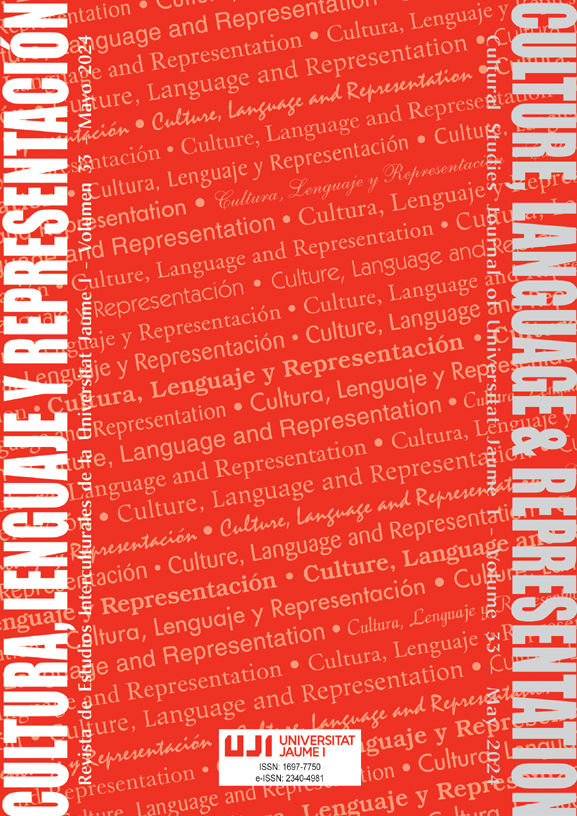Signos rotos. Fracturas de lenguaje en la esfera pública, de Beatriz Gallardo Paúls. Valencia: Tirant Lo Blanch, 2022.
Contenido principal del artículo
Descargas
Los datos de descargas todavía no están disponibles.
Detalles del artículo
Cómo citar
Garde Eransus, E. (2024). Signos rotos. Fracturas de lenguaje en la esfera pública, de Beatriz Gallardo Paúls. Valencia: Tirant Lo Blanch, 2022. Cultura, Lenguaje Y Representación, 33, 241–243. https://doi.org/10.6035/clr.7178
Número
Sección
RESEÑAS / REVIEWS
Se utiliza una licencia de derechos de autor CREATIVE COMMONS de acceso abierto.
Aquellos autores/as cuyos trabajos sean publicados por esta revista esta revista, aceptan los términos siguientes:
Concretamente mediante las siguientes acciones:
- - Los autores/as conservarán sus derechos de autor y garantizarán a la revista el derecho de primera publicación de su obra, el cuál estará simultáneamente sujeto a la Licencia de reconocimiento de Creative Commons CC BY SA que permite a terceros compartir la obra siempre que se indique su autor y su primera publicación esta revista.
- - Cumplimiento de un porcentaje mínimo del 40% de mujeres como revisoras de los trabajos enviados a la revista.
- - Los autores/as conservarán sus derechos de autor y garantizarán a la revista el derecho de primera publicación de su obra, el cuál estará simultáneamente sujeto a la Licencia de reconocimiento de Creative Commons CC BY SA que permite a terceros compartir la obra siempre que se indique su autor y su primera publicación esta revista.
- - Los autores/as podrán adoptar otros acuerdos de licencia no exclusiva de distribución de la versión de la obra publicada (p. ej.: depositarla en un archivo telemático institucional o publicarla en un volumen monográfico) siempre que se indique la publicación inicial en esta revista.
- - Se permite y recomienda a los autores/as difundir su obra a través de Internet (p. ej.: en archivos telemáticos institucionales o en su página web) antes y durante el proceso de envío, lo cual puede producir intercambios interesantes y aumentar las citas de la obra publicada.
Citas
Bakir, Vian y McStay, Andrew (2018). Fake News and The Economy of Emotions. Digital Journalism, 6(2), 154-175. https://doi.org/10.1080/21670811.2017.1345645
Breeze, Ruth (2019). Emotion in politics: Affective-discursive practices in UKIP and Labour. Discourse & Society, 30(1) 24-43. https://doi.org/10.1177/0957926518801074
Fernández Lagunilla, Marina (1999). La lengua en la comunicación política II: La palabra del poder. Arco Libros.
Gallardo-Paúls, Beatriz (2014). Usos políticos del lenguaje: un discurso paradójico. Anthropos.
Gallardo-Paúls, Beatriz (2018). Tiempos de hipérbole. Inestabilidad e interferencias en el discurso político. Tirant Lo Blanch.
Guitart Escudero, María Pilar (2005). Discurso parlamentario y lenguaje políticamente correcto. Congreso de los Diputados.
Ong, Walter (1982). Oralidad y escritura: tecnologías de la palabra. Fondo de Cultura Económica.
Wirz, Dominique S. (2018). Persuasion through emotion? An Experimental Test of the Emotion-Eliciting Nature of Populist Communication. International journal of communication, 12, 1114-1138. Recuperado a partir de https://ijoc.org/index.php/ijoc/article/view/7846/2287
Breeze, Ruth (2019). Emotion in politics: Affective-discursive practices in UKIP and Labour. Discourse & Society, 30(1) 24-43. https://doi.org/10.1177/0957926518801074
Fernández Lagunilla, Marina (1999). La lengua en la comunicación política II: La palabra del poder. Arco Libros.
Gallardo-Paúls, Beatriz (2014). Usos políticos del lenguaje: un discurso paradójico. Anthropos.
Gallardo-Paúls, Beatriz (2018). Tiempos de hipérbole. Inestabilidad e interferencias en el discurso político. Tirant Lo Blanch.
Guitart Escudero, María Pilar (2005). Discurso parlamentario y lenguaje políticamente correcto. Congreso de los Diputados.
Ong, Walter (1982). Oralidad y escritura: tecnologías de la palabra. Fondo de Cultura Económica.
Wirz, Dominique S. (2018). Persuasion through emotion? An Experimental Test of the Emotion-Eliciting Nature of Populist Communication. International journal of communication, 12, 1114-1138. Recuperado a partir de https://ijoc.org/index.php/ijoc/article/view/7846/2287


